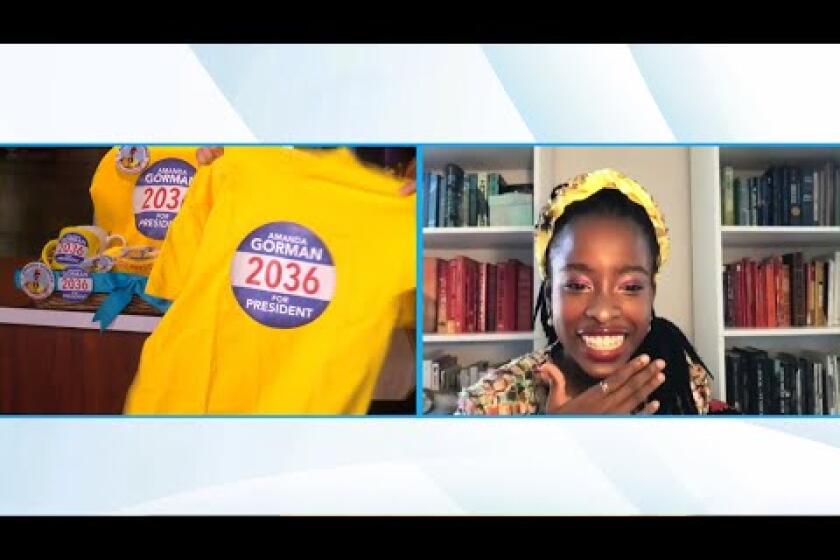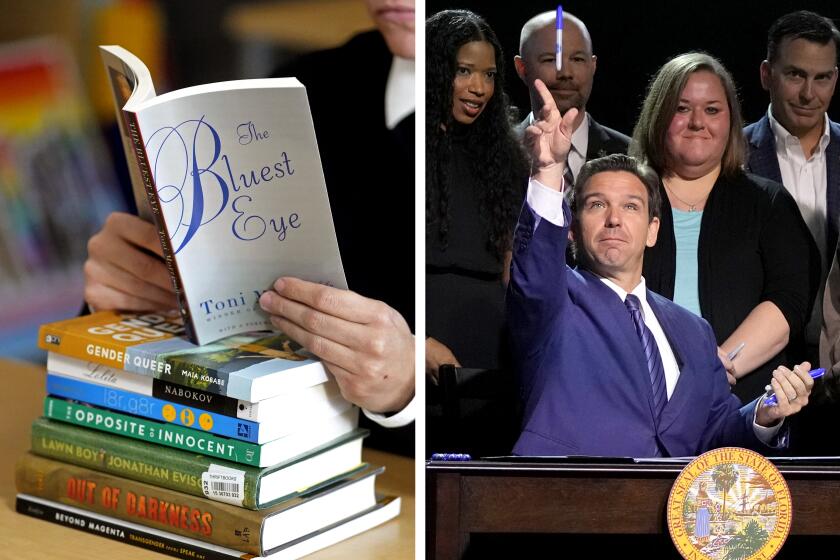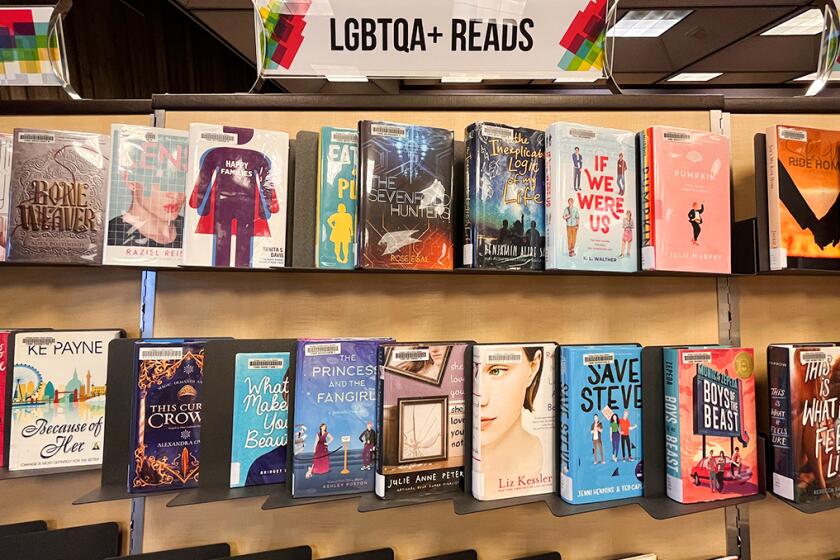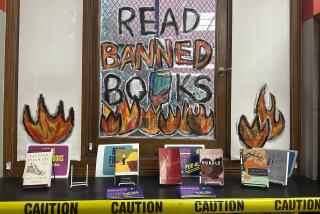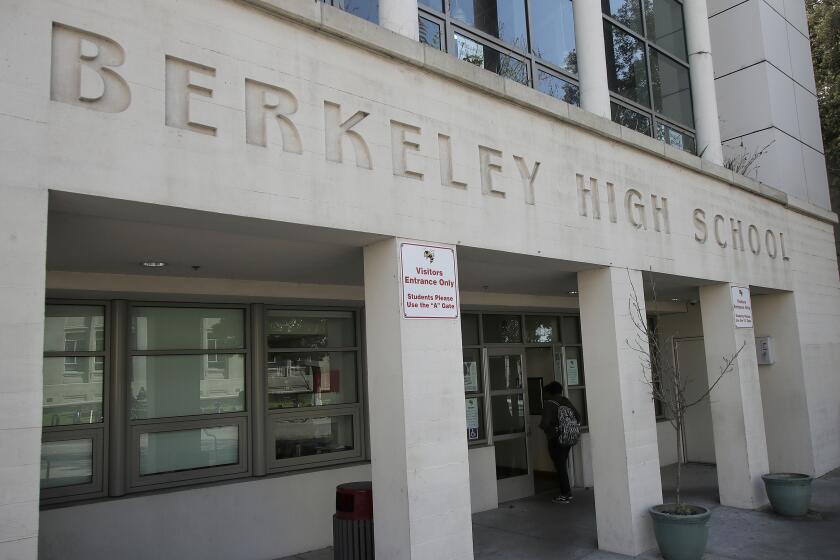Amanda Gorman on her inauguration poem being banned at Miami school: ‘I am gutted’
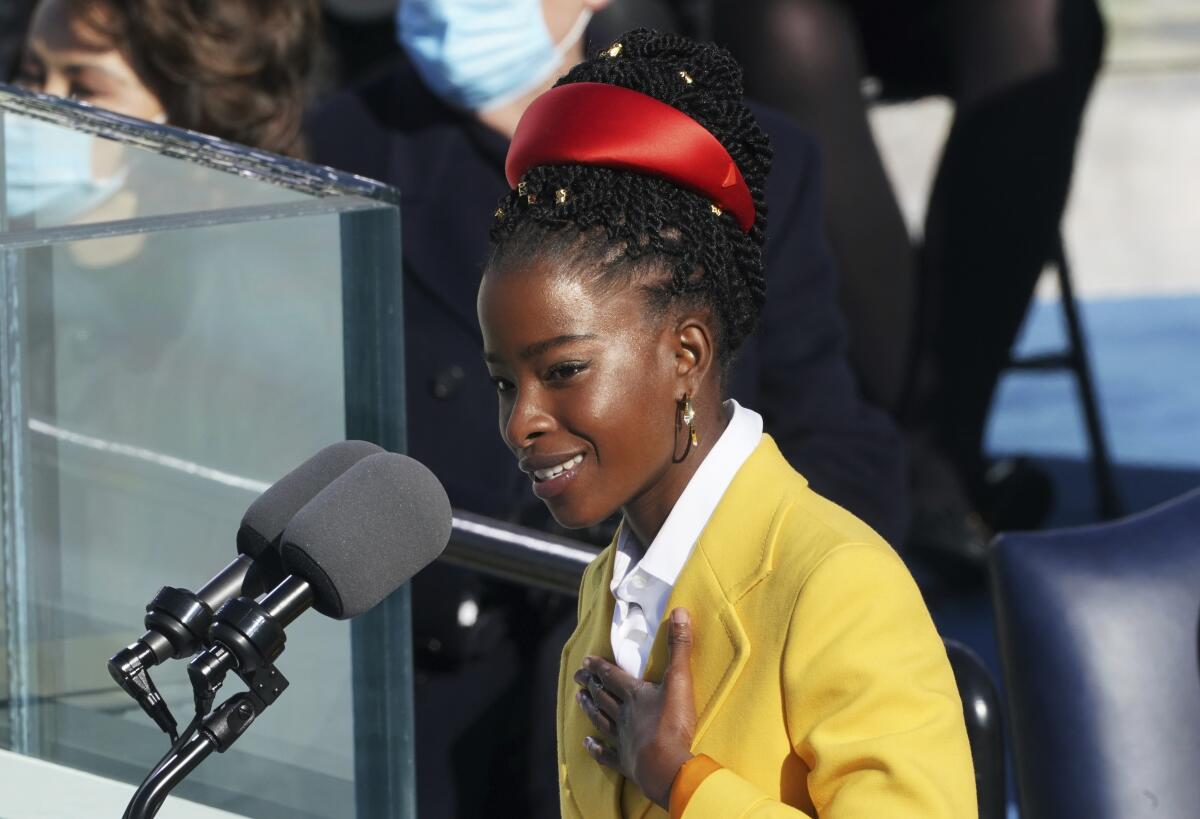
Bob Graham Education Center, a K-8 school in Miami-Dade County, restricted access to Amanda Gorman’s acclaimed poem “The Hill We Climb,” which she read at President Biden’s inauguration, for elementary-age students after a parent issued a formal complaint on the grounds that the poem was “not educational” and included indirect “hate messages.”
A committee restricted “The Hill We Climb” based on the single complaint, provided to The Times by the Florida Freedom to Read Project, a parent-driven organization defending student access to information and ideas.
Daily Salinas of Miami Lakes, Fla., the mother of two Bob Graham students, filed the complaint in March and asked that the poem be removed from the “total environment” rather than just age-restricted, writing that the poem was “not for schools” as it was written to “cause confusion and indoctrinate students.”
When asked if she was aware of professional reviews of the National Youth Poet Laureate’s poem, Salinas wrote, “I don’t need it.” And when asked to list the author, she wrote Oprah Winfrey. (Winfrey wrote the foreword for the book version of the poem published in March 2021.)
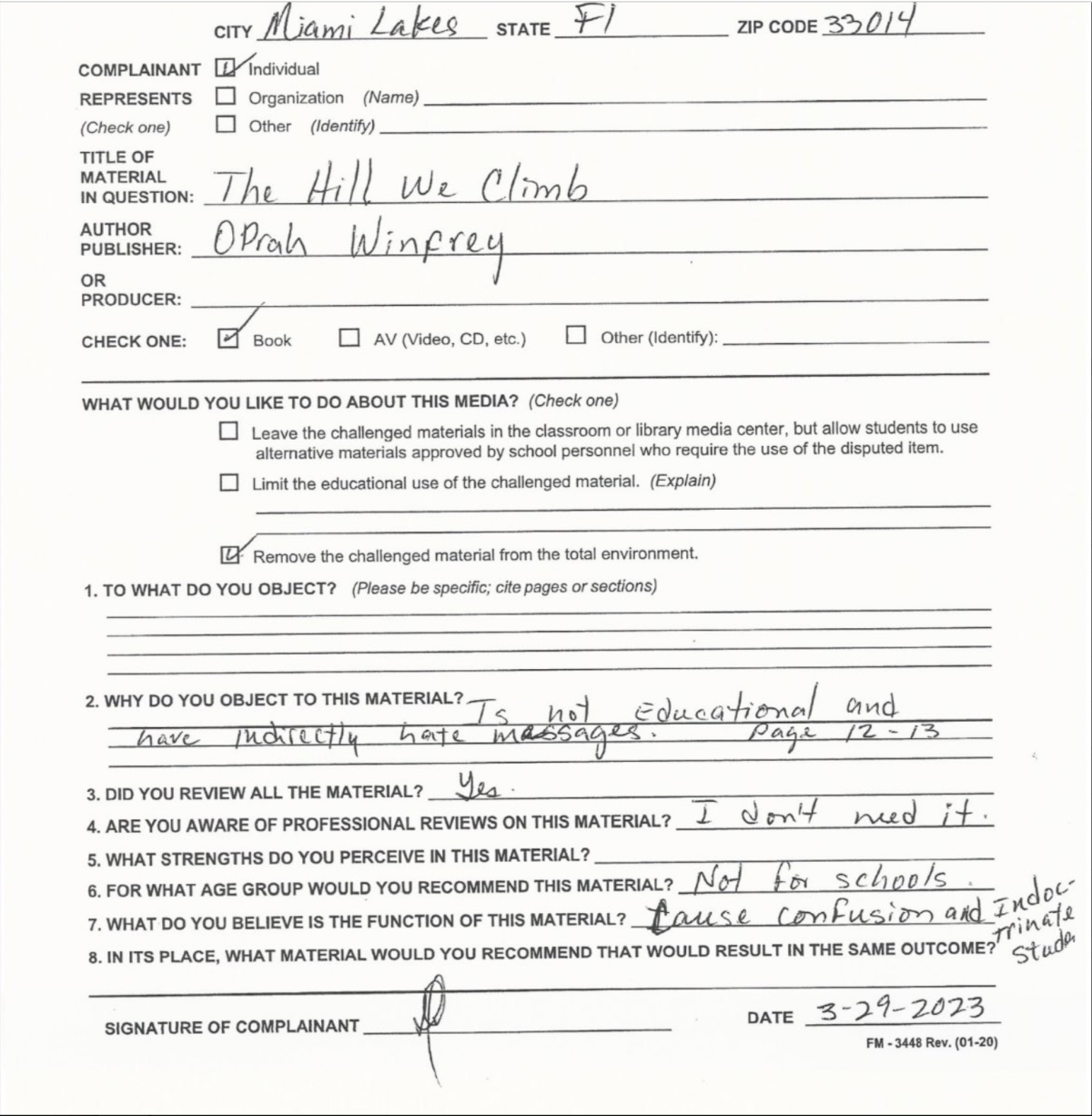
The pages Salinas referenced in her complaint include the lines, “We’ve braved the belly of the beast. We’ve learned that quiet isn’t always peace. And the norms and notions of what ‘just is’ — Isn’t always justice.
“And yet the dawn is ours before we knew it. Somehow, we do it. Somehow, we’ve weathered and witnessed — A nation that isn’t broken, but simply unfinished.”
In January 2021, prior to reciting “The Hill We Climb” at Biden’s inauguration, Gorman told the Washington Post, “My hope is that my poem will represent a moment of unity for our country, that with my words I’ll be able to speak to a new chapter and era for our nation.”
Salinas also challenged the books “The ABCs of Black History,” “Cuban Kids,” “Countries in the News Cuba” and “Love to Langston,” according to records obtained by the Florida Freedom to Read Project.
The principal of Bob Graham Education Center and the superintendent of the Miami-Dade School District did not immediately respond to requests for comment.
Gorman issued a statement on her Instagram on Tuesday saying she was “gutted” by the move.
“So they ban my book from young readers, confuse me with Oprah, fail to specify what parts of my poetry they object to, refuse to read any reviews, and offer no alternatives,” she wrote. “We must fight back.
“Book bans aren’t new,” she continued, “but they have been on the rise — according to the [American Library Assn.], 40% more books were challenged in 2022 compared to 2021. What’s more, often all it takes to remove these works from our libraries and schools is a single objection. And let’s be clear: most of the forbidden works are by authors who have struggled for generations to get on bookshelves. The majority of these censored works are by queer and non-white voices.
“I wrote ‘The Hill We Climb’ so that all young people could see themselves in a historical moment. Ever since, I’ve received countless letters and videos from children inspired by ‘The Hill We Climb’ to write their own poems. Robbing children of the chance to find their voices in literature is a violation of their right to free thought and free speech.
“What can we do? We must speak out and have our voices heard. That’s why my publisher, Penguin Random House, joined PEN America, authors and community members in a lawsuit in Florida’s Escambia County to challenge book restrictions like these.”
PEN America and publisher Penguin Random House filed a federal suit against Escambia County School District over its removal of books from school libraries.
On Tuesday evening, Miami-Dade County Public Schools released a statement via Twitter disputing the wording of reports: “In order to ensure accurate information, [Miami-Dade] is compelled to clarify that the book titled, ‘The Hill We Climb’ by [Amanda Gorman] was never banned or removed from one of our schools. The book is available in the media center as part of the middle grades collection.”
PEN America responded Wednesday with a statement addressing confusion over whether a restricted book qualifies as a banned book.
“The book may remain available to middle-school students, but when you restrict or diminish access to a book, that’s a ban,” the statement read. “Moving “The Hill We Climb” to middle-school shelves means elementary students can’t or won’t get it; their access has diminished. “
Gorman also issued her own impassioned statement in response to Miami-Dade. “A school book ban is any action taken against a book that leaves access to a book restricted or diminished,” she said in the statement posted on Twitter. “This decision of moving my book from its original place, taken after one parent complained, diminishes the access elementary schoolers would have previously had to my poem.”
Raegan Miller, director of development for the Florida Freedom to Read Project, explained to The Times in an interview that the review committee said it was restricting Gorman’s poem because, “though it did have educational value,” its vocabulary was too complex for elementary-age students.
Miller said the issue of a book’s age-appropriateness often is used as a loophole to restrict books, because of the vague nature of the classification. The same, she said, is happening with books challenged on the grounds of sexual content.
“In a state whose literacy rates are not super impressive, I don’t know why you would not be trying to develop readers and stretch them and help them grow and become better readers,” Miller said. “Especially if it’s something that interests them and it’s self-selected.”
Any parent can file a complaint and send a book up the chain of review committees, which Miller says are made up of parents and media specialists trained in vetting library books in the aftermath of Florida Gov. Ron DeSantis’ bill HB 1467.
As attempts to ban or restrict books reach a record high in the U.S., public libraries and school districts have become new battlegrounds for the nation’s ever-present culture wars.
“That was the big claim, that our libraries were filled with porn and indoctrination,” Miller said. “And so when it came time, they had to create the committee and they had to have parents on the committee. The Department of Education last August sent out an email to all districts asking for superintendents to nominate parents.”
While parents have access to a list of the book titles filling school library shelves, they are not necessarily perusing the aisles and reading material themselves. Many are echoing the objections from such websites as Book Looks, which offers a boilerplate for parents to follow and was founded by a member of the Brevard County, Fla., chapter of the group Moms for Liberty.
The news of Gorman’s poem becoming inaccessible to elementary-school students at Bob Graham Education Center comes just a week after publishing conglomerate Penguin Random House joined free-speech advocacy group PEN America in suing Florida’s Escambia County School District for constitutional violations pertaining to book bans.
Opinions seemed to be divided across Miami-Dade. On Thursday, Miami-Dade school board member Lucia Baez-Geller issued a statement referring to Gorman’s book being “removed” and blaming Gov. Ron DeSantis’ “divisive rhetoric and political agenda.”
“I am extremely disappointed by the recent news that Amanda Gorman’s poem, ‘The Hill We Climb,’ was removed due to a parent’s complaint that the poem had ‘indirect hate messages.’ I’ve read this poem and it does not have hate messages–Period.” She said the agenda was hindering students from receiving the education to which they are entitled, and concluded, “our community will not stand for this.”
The mayor of Miami-Dade County, Daniella Levine Cava, expressed support for Gorman on Wednesday. Addressing the poet directly via Twitter, she said, “Your poem inspired our youth to become active participants in their government and to help shape the future. We want you to come to Miami-Dade to do a reading of your poem. If you’re in, we will coordinate.”
L.A. Times Book Club: State of Banned Books
What: Actor, author and “Reading Rainbow” founder LeVar Burton joins the L.A. Times Book Club to discuss the State of Banned Books with Times editor Steve Padilla.
When: May 24 at 7 p.m. Pacific.
Where: ASU California Center, 1111 S. Broadway, Los Angeles. This book club event is available virtually. Get tickets.
Join us: Sign up for the Book Club newsletter for latest books, news and events
More to Read
The biggest entertainment stories
Get our big stories about Hollywood, film, television, music, arts, culture and more right in your inbox as soon as they publish.
You may occasionally receive promotional content from the Los Angeles Times.
